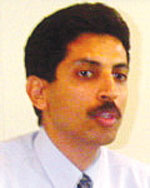
|
 |
 |
|
|
|
|
|
|
|
|
|
|
|
|
|
|
|
|
|
|
|
|
|
|
The Trial of Human Rights Activist Abdulhadi Al Khawaja:7 January Speech Determines the Fate of Next SessionsOn 8 March 2009, the Supreme Criminal Court began the first public hearing of human rights activist Abdulhadi Al Khawaja, the former President of Bahrain Centre for Human Rights-officially dissolved in November 2004. The session was held in the presence of a number of international human rights organisations including Human Rights Watch and Front Line, as well as the defence lawyers Mohamed Ahmed and Hafiz Ali, and the media and family of the accused. The judge read out all the Public Prosecutor’s charges against Khawaja. According to the charges, Khawaja made a public speech in the morning of 7 January 2009 during a religious event in which he promoted the overthrow of the political system of the country by force, publically incited hatred and contempt for the regime and intentionally spreading lies and rumours about the internal affairs of the country which could disturb public order and harm public interest. After this the judge asked Khawaja if he was guilty of the charges to which he pleaded not guilty. At this point the Public Prosecutor requested to play a DVD containing Khawaja’s speech, which all the accusations were based on, but the lawyer Muhammad Ahmad refused to do so because it was not shown to the defence counsel beforehand as the main evidence for the accusations. The Defence team relied on two main issues their defence. Firstly, they challenged all the accusations against Khawaja and said they were unconstitutional as they violate article 23 of the Constitution regarding freedom of expression, noting that what their client said
Andrea Rocca from Front Line attended the session and felt that ’the Khawaja trial and the charges against him are based on the practice of his right to express his views, which are guaranteed under the right to freedom of expression, regardless of the content of the statements made Khawaja. The government needs to be more receptive to criticism, especially with regards to charges of attempt to overthrow the government, which is not supported by evidence on the ground considering that Khawaja did not call for the use of force). He continued by saying that preventing Khawaja from leaving the country hinders his work as member of Front Line. Advocate-General, Abdulrahman Al Sayid, replied to Rocca’s statements by saying they were ‘incorrect, and stem from a misinterpretation of the nature of the accusations and from failing to grasp the Prosecution’s evidence’ adding that ‘all the accusations have nothing to do with freedom of expression or any human rights’, noting that there is a huge difference, from the point of view of the law and Constitution, between the legitimate criticism of state practices and between ‘the direct call to violently and forcefully oppose and change the regime’. He also excused Front Line’s representative by saying ’it is obvious that Andrea Rocca made his statement without looking into the case papers or referring to official sources in order to comprehend the evidence available against the accused. Had he done this, he would not have said that the accused did not call for the use of violence because there is a video tape of his provocative speech showing that he was clearly and publically calling for regime change using violent means’. Human Rights Watch have issued a statement regarding the trial of Khawaja in which they demanded all charges against him be dropped and for the travel ban against him to be lifted, calling for the expansion of the margin of freedom of expression in Bahrain. They added that ’putting Khawaja on trial is one procedure amongst many which limits freedom of expression despite the fact that the country’s Constitution protects this right’. The Deputy Executive Director of the Middle East and North Africa at Human Rights Watch, Joe Stork, said that; (The profess to speak forcefully about the rulers of the country should not be considered a crime, and the government, which claims that it promotes democracy and human rights, such as Bahrain, should not send people to prison as a result of their spoken or written words). He added that ‘a government which claims to be promoting democracy and human rights , as Bahrain does, should not be putting people in jail for what they say or write’. In any case, it is crucial that standards of fair trial take place during future hearings as well as the presence of representatives of international organizations in order to ensure the fairness of the procedures, to discover the truthfulness of the allegations and to determine whether they merit punishment. This is what the next hearing sessions will unveil. |
